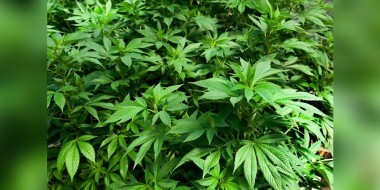New York, NY--The popularity of hemp lies in its adaptability. One of the first plants to be spun into fabric, hemp, or industrial hemp, can be used to make various products. Like bamboo, hemp is one of the fastest growing plants on the planet and can be refined to make products and commercial items such as paper, textiles, rope, biodegradable plastic, paints, biofuel, and more.
[Image via Flickr Commons]
Some say that hemp has the potential to save a planet stained by the notoriety of plastic and its widespread use. The plant is also not new to the U.S. It used to be cultivated as a major cash crop before being classified as a Schedule I controlled substance in 1937. The long lull — only insignificant in hemp's long enough usage timeline — finally ended when former U.S. President Donald Trump signed the 2018 Farm Bill, which legalized hemp and removed it from the Controlled Substances Act. The U.S. Secretary of Agriculture, Sonny Perdue, even announced a program in 2019 which allowed farmers to grow hemp legally under federal-approved plans — a move that was a big win for legal hemp advocates and the industry at large.
The many benefits of industrial hemp
Hemp's steady entry into industrial production comes at a time when the world has had enough of plastic. Plastic has piled up not just in the U.S. but the world. The Environmental Protection Agency has noted that Americans generate around 36 million tons of plastic, and about 12.2% of it is municipal solid waste. Another report states that there are 8.3 billion tons of plastic worldwide, and much of it — around 6.3 billion tons — is trash.
With little recycling in the face of amassed plastic waste, looking at alternatives was only a matter of time. In comes hemp — it is natural, durable, recyclable, and biodegradable. It's derived from marijuana, and now that the stigma around marijuana is fading away, hemp's popularity has only soared.
A significant factor in hemp's popularity comes from its growth rate. Trees need to be between 10-30 years old before they can be used for paper. For hemp, the maturity period is only between 60-90 days, implying it can be used season after season. Hemp paper is also stronger than paper made from wood and is known to last long. For instance, hemp documents that are more than 400 years old are still known to be intact. Hemp's bleach-free — there is no need to add toxic chemicals to the paper-making process. Hemp paper can also be recycled more times than tree paper.
Hemp is also a winner when it comes to textiles. An acre of hemp can produce as much material as 2-3 acres of a cotton plantation. It's also several times warmer. Being stronger than cotton, hemp clothes last longer.
Hemp has gained popularity as a building material and can be used as a substitute for concrete. Structures built out of hemp are known to be good insulators and can last several hundred years.
"We can make some materials lighter, reduce vibrations or add thermal insulation. These new properties can help make materials more high-performing," says Arnaud Day, scientific director at Fibres Recherche Développement, in a news report.
Researchers are only now discovering the many benefits of hemp and its potential in our everyday lives. According to a report, the global industrial hemp size was over $205 million in 2020. It is estimated to grow at a rate of 6% between 2021 and 2027, credit to enhanced demand post-legalization and its many applications.
However, despite its renewed lease of life, several challenges remain around hemp cultivation and why it's not becoming a mainstream habit.
Not free of challenges
The versatile crop has recently seen significant popularity, with legalization being a prime factor. Iowa State University notes that the biggest challenge for anyone exploring industrial hemp, either as a landowner or a producer, lies in finding secure market channels. For example, farmers in all states have markets for crops, animals, and other products. But this is not the case with hemp everywhere.
The lack of an organized market in many states can be a discouraging factor for hemp cultivators. Hemp can have high processing costs, so farmers cannot rely on buyers to come to their door while they spend time and resources on processing hemp. Besides, the development of the hemp market can take time. The approval process can be long too.
For farmers that have dived into this opportunity, their experiences may not serve as a motivation to those looking forward to cultivating hemp. The proceeds from hemp cultivation in the past few years have discouraged some farmers who wished to ride the hemp wave, leaving them in two minds. The reason, agricultural experts say, lies in the industry's need to rebalance itself.
Experts believe that the hemp market stabilization could take years, and even after that, it could only remain a specialty crop. "I think that's the point that a lot of people miss," Tyler Mark, an assistant professor of production economics at the University of Kentucky, told an outlet. "In the grand scheme of things, this is a very small crop that has a long way to go to get to where it's really relevant and competitive."
The long-prevailing uncertainty of states has stirred the market, and there's little hope for industry-wide change unless it starts from the top, where major brands and companies look into streamlining hemp production and push for a positive directive around it. Awareness of hemp is also another prime factor. But with how things have unfolded post-legalization, it could only be a matter of time when more consumers become aware of this plant, forcing cultivators and manufacturers to turn their heads in this direction.
